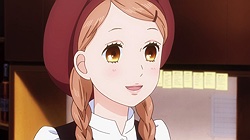 |
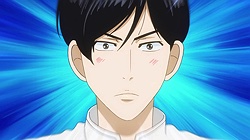 |
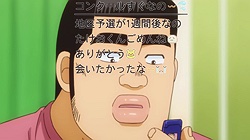 |
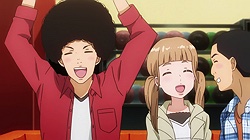 |
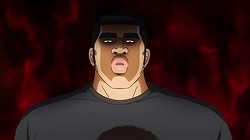 |
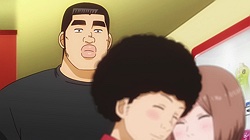 |
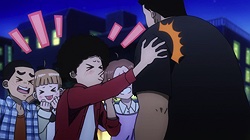 |
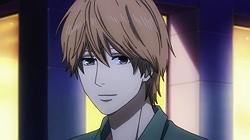 |
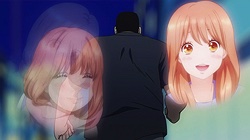 |
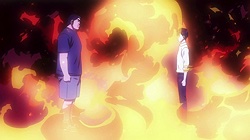 |
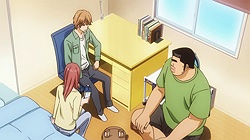 |
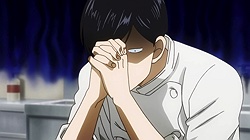 |
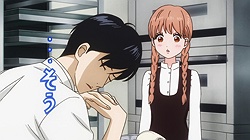 |
 |
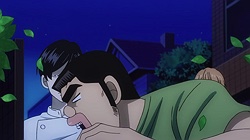 |
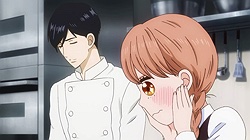 |
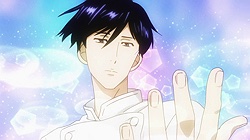 |
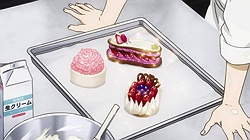 |
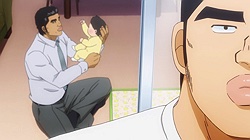 |
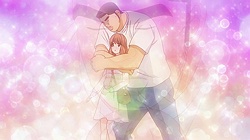 |
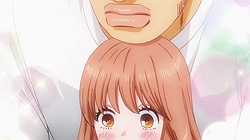 |
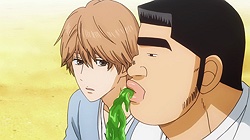 |
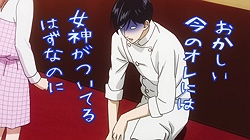 |
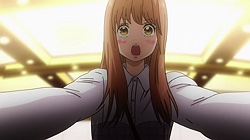 |
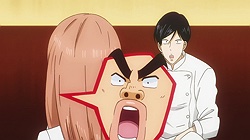 |
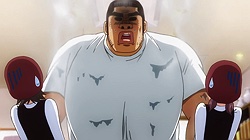 |
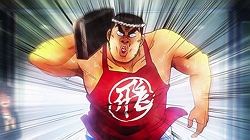 |
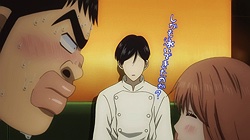 |
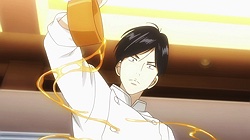 |
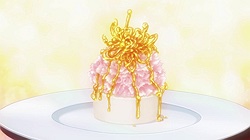 |
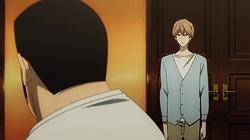 |
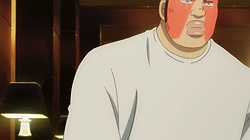 |
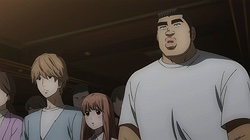 |
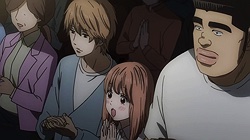 |
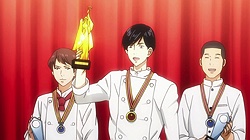 |
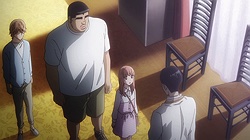 |
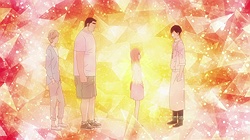 |
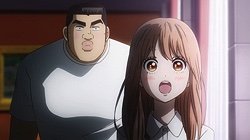 |
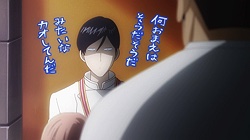 |
「俺のココロ」 (Ore no Kokoro)
“Ore no Kokoro”
That was an ending that highlighted both this series’ charm, and its limitations.
I really don’t think there’s any other wayOre Monogataricould have ended, or perhaps evenshouldhave ended. So I’m not disappointed with this finale in any significant way. But at the same time, you can’t shake the fact that it was predictable in pretty much every sense of the word, and that’s not in and of itself a good thing. Par for the course in this instance, perhaps, but not a birdie.
Would I have ended the series with the arc that preceded this one – Suna and Yukika? No, probably not – despite the fact that it was the dramatic highlight of the series. For all that Suna was the much more interesting character, he’s not the “Ore” in the title, and you have to end with the dude that is. The manga forOre Monogatariis ongoing, of course, so the anime was always going to have to find a non-ending to end on. And conventional as it was, the certainly made the obvious choice.
It’s always been a condition of Takeo and Rinko’s story that there’s not much mystery to it. It’s kind of the anti-anime romance because the characters are absurdly open with how they feel about each other for at least 80% of the series run. As a result there’s not much mystery to the events of this arc – of course Rinko isn’t going to to choose Ichinose, no matter what happens. Anyone who watched the first 23 episodes of this show knew exactly how the 24th was going to play out, and while that can be (and indeed was) comfortable and charming, it’s not especially suspenseful or exciting.
Knowing how the final act would unfold, the only unknown here was how the series would get there. Again we don’t see anything too shocking – it’s not Ore Monogatari’s way to have major players be villains, to Ichinose was always likely to end up being more of an antagonist. His relationship with Takeo put me in mind of the greatChihayafuru“Teki” debate – just what did Taichi intend to say when he used that word about Arata?
Everyone in this final episode behaves in a way that’s very true to themselves. Takeo worries that he’s standing in Rinko’s way, but ultimately decides to fight for her. It never even occurs to Rinko to consider Ichinose as a potential mate. Suna (though in a somewhat depressingly peripheral way) stays loyal to Takeo. And Ichinose struts around like the peacock he is, for all his bluster dedicated to his art and quite genuine in his conviction that he and Rinko were meant to be together (let’s forget that’s creepy), and he never really seems like the sort of guy who’d push Rinko to do anything against her will.
Having Takeo end up saving Ichinose’s bacon is a fun touch, and having him finally muster the courage to speak Rinko’s name is nice capstone to their relationship development. It’s not exactly a dynamic relationship, but it is refreshing honest and transparent. There is some progress here, not just the name-calling but Takeo finally answering the question he earlier posed – yes, it is OK for Rinko to be with him. She’s capable of making her own choices, and by disrespecting himself he’s disrespecting those choices.
While it could never have finished with Suna’s stunted romantic life, I suppose the other wayOre Monogataricould have ended would have been by focusing on Take and Suna’s relationship. It would have been riskier but ultimately I think more rewarding, because that relationship is the deepest and most emotionally resonant in the series. Maybe it deserved a little more than to be an afterthought in the finale, but it still stood out over the course of 24 episodes more than any other element. I did enjoy the last shot, thought – Takeo being so tall his head couldn’t even fit in the frame. That, ironically, was a very fitting image to end on.
WhileOre Monogatarifalls short of being a masterpiece, it’s an excellent series that brought an awful lot of good things to the table. It handled the big moments – the crisis with Suna’s father and Takeo’s mother having the baby – very well. And it sparkled when dealing with the tangential and futile romances – Ai’s futile love for Takeo and Oda’s for her, Saijou’s crush on Takeo. It was always better when it was bittersweet than simply sweet, and that meant when the camera was turned to the “secondary” storylines and not the main romance.
The series’ lasting impression for me, though is Suna and his friendship with Takeo. It’s a great modern bromance, full of the depth and complexity the romantic headliner doesn’t have too much of, and Suna is a great character. If Takeo and Rinko were transparent Suna was always a riddle, mysteriously willing to forever be a supporting character even in his own life. And I liked the fact that the series concluded that he might make a choice not to pursue love simply for the sake of doing it – that deciding not to define himself that way was a legitimate choice in life. It’s not a statement we see many manga or anime make, and it’s one of the most distinctive elements of this series.
ED3 Sequence
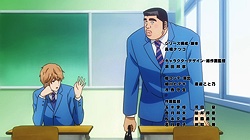 |
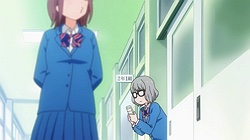 |
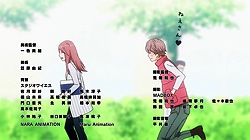 |
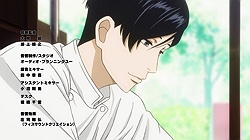 |
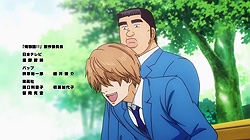 |
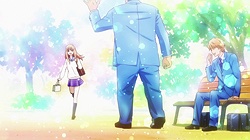 |
ED Sequence
End Card
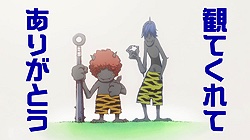 |

Was it just me or the episode seemed a little too hurried? Such as the pace of the dialogues and the overwhelming amount of blue sentences covering(obstructing?) the view?
I started this series right before my birthday and let me tell anyone who has never tried a sachertorte, you should definitely try one.
This series was super cute, and it was absolutely a ball to sit through this and see a solid relationship from start to finish instead of the girl being the end prize. I would recommend it to anyone. 😀
I loved how Rinko rubbed her confession in Ichinose’s face.
The ending wasn’t full of impact but ended nicely enough. Overall, a pleasant series with great humour. I agree that Suna is the most intriguing one in the series.
So no romantic ending for Suna, eh.
https://randomc.net/image/Ore%20Monogatari/Ore%20Monogatari%20-%2024%20-%20Large%2008.jpg
Suna already has Takeo.
Man, Suna (and Takeo’s mom) screaming was utterly hilarious.
I am Happy, that in the End “Trust” have Won